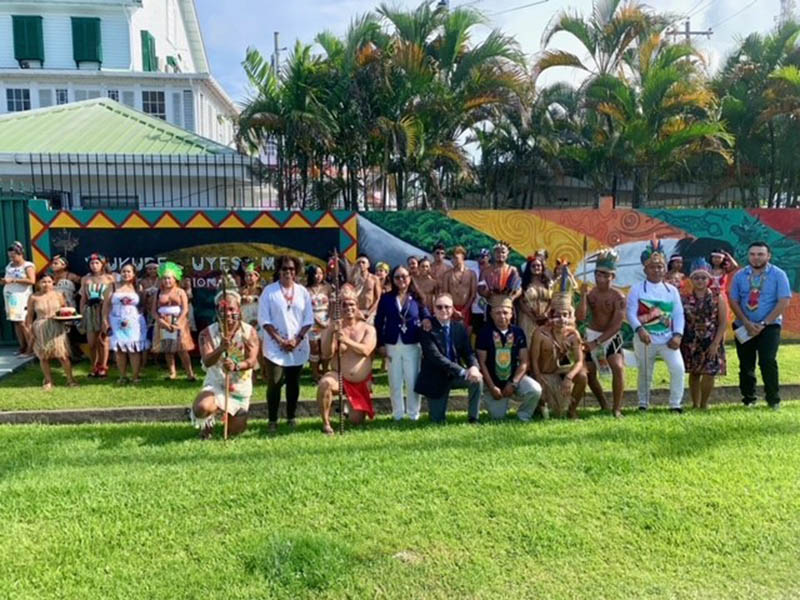On the occasion of the International Day of the World’s Indigenous Peoples on Tuesday, the United Nations Guyana and the High Commission of Canada partnered with the Pakuri council on a cultural exchange which saw over 50 of the villagers visiting Georgetown in their traditional garb.
A release from the Canadian High Commission said that the Toshao of Pakuri Village, Timothy Andrews, stated that most persons in Georgetown only experience Indigenous culture when they visit interior communities. However, through the cultural exchange, the residents of Pakuri Village – formerly known as St Cuthbert’s Mission – were brought to Georgetown as a way to directly integrate Indigenous culture in the heart of the city.
“Seeing an Amerindian person dressed in their native wear in the heart of Georgetown should not be a surprise a regular business day,” Toshao Andrews stated. “This drive was to shift perceptions and increase awareness of Indigenous culture,” he added.
Minister of Amerindian Affairs Pauline Sukhai and Deputy Speaker of the National Assembly Lenox Shuman accompanied the team throughout the day as they met with partners.
As a part of the drive, the Pakuri delegation participated in cultural programme at the High Commission of Canada. Andrews thanked Canada for its support of Indigenous Peoples in Guyana and expressed his interest in adding his village to the list of communities that the High Commission is working with.
Recently, the High Commission through the Canada Fund for Local Initiatives, partnered with the Mainstay/Whyaka Village to fund a project aimed at providing training on climate smart agriculture and tourism.
High Commissioner Mark Berman reiterated that Canada is committed to advancing the interests of Indigenous peoples.
“Cultural exchanges, like this one, are an especially distinctive vehicle for sharing Indigenous people’s expression, uniqueness and experiences and we are profoundly grateful to share this cultural exchange with you.
“Indigenous peoples have been the custodians of a vault of knowledge on the environment, arts, foods, medicines and traditions, to name a few, that we must preserve as we focus on a pathway to learning, respect and reconciliation,” Berman said, according to the release.
Shuman, in his remarks, said that he can recall since his youth, Canada has been actively engaged with the Indigenous communities in Guyana and advocating for Indigenous people globally.
“The Indigenous people are appreciative of the partner that we have in Canada and the role that Canada’s government has played and continues to play on the International Stage, advocating for the rights of Indigenous People,” he said.
In addition to the programme at the High Commission, the entire team visited the United Nations Office in Georgetown, where the group interacted with UN Heads of agencies and staff. Dr. Gillian Smith, UN Resident Coordinator a.i. underlined the role of Indigenous women, particularly in perpetuating traditional knowledge and Indigenous languages to younger generations. Dr Smith encouraged all efforts to revitalise and preserve Indigenous languages.
She said that the UN support to indigenous communities ranges from educational services to healthcare services and treatment, the Amerindian land titling process, Information Communications Technology (ICT) access and e-services, strengthening social and health systems, supporting Indigenous communities with migrants and Indigenous migrants, to traditional knowledge systems.
The Region Four villagers completed the visit with a tour of some parts of the city including the Stabroek Square.





